Fentanyl killed 672 people in Fort Worth area. Will threat of murder charge stop dealers?
Kyle Sexton was 16 years old when he died on the back porch of his family’s home in Fort Worth.
He had taken what he thought was a pain pill, given to him by a friend. Instead, he took a fake Percocet laced with fentanyl.
The teenager’s death in 2020 devastated his family, but also left his mother, Stephanie Hellstern, feeling a potent lack of justice. Who would be held accountable for making the poisoned counterfeit pill? Did the person who sold Kyle the pill know it had fentanyl in it? Did they leave her son to die on the floor instead of helping him?
Since Kyle’s death, a staggering surge in fentanyl-related overdoses across Tarrant County has left hundreds more families asking the same painful questions. In 2019, only 15 people died from fentanyl intoxication in Tarrant and three neighboring counties. That number had skyrocketed nearly 1,400% by 2022, when fentanyl was cited in 224 deaths, according to a Star-Telegram analysis of medical examiner records.
In all, at least 672 people as young as 14 have accidentally died from fentanyl since 2019 in Tarrant, Denton, Parker and Johnson counties.
As Hellstern grieved her son, she talked with policy advocates and learned about laws in other states that allow drug-related deaths to be prosecuted as murders.
“And I was like, why doesn’t Texas have that?” Hellstern said. “Texas is an ‘eye for an eye’ state.”
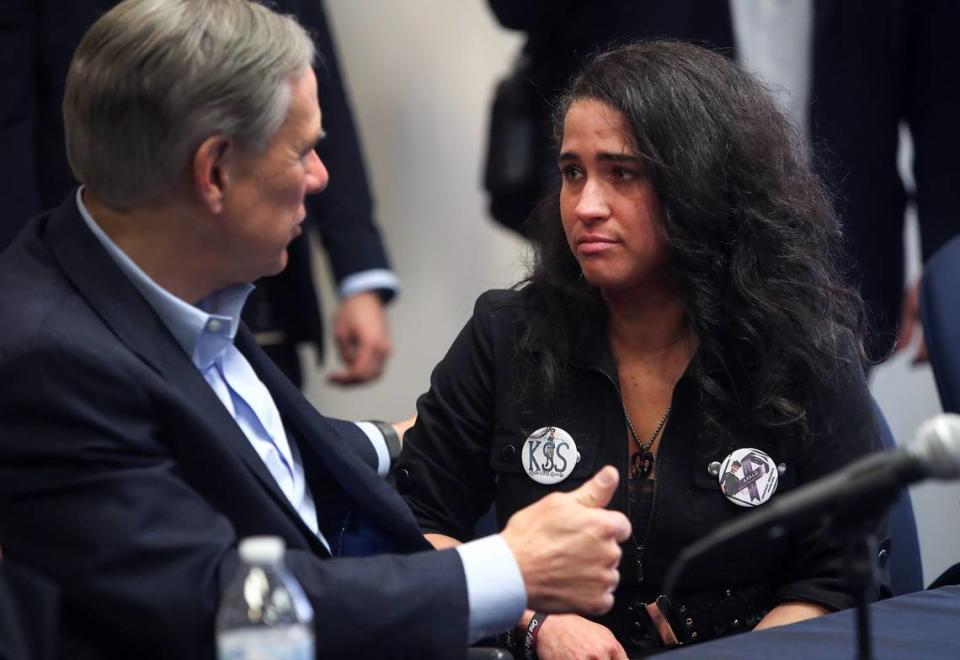
Dozens of other parents joined Hellstern in a campaign for Texas to adopt such legislation. Three years later, in June, Gov. Greg Abbott signed a drug-induced homicide law, which goes into effect Sept. 1.
Texas law enforcement and district attorneys say they intend to use the new law to send a strong message to dealers. But some experts say the new law will do more harm than good. And families of the dead are grappling with mixed feelings.
“We need to look at both sides of this. Yes, we want this to stop children from dying,” Hellstern said. “But on the other hand, nothing will bring our kids back.”
What is drug-induced homicide in Texas?
Drug-induced homicide laws already exist in at least 25 states. The Texas law says someone who knowingly gives fentanyl to a person who overdosed could be charged with murder. It applies only to deaths after Sept. 1.
Texas Rep. Craig Goldman of Fort Worth, who sponsored the legislation under House Bill 6, said his family has been personally impacted by the fentanyl crisis. He had spoken with district attorneys and law enforcement across the state and asked them, “What is the strongest law we could pass to benefit first and foremost law enforcement to punish these people who are bringing fentanyl into the state?”
They told him current laws didn’t have “enough teeth” to go after big distributors.
In June, Abbott also signed Senate Bill 645, which creates harsher penalties for fentanyl distribution and possession. The penalty for possessing or selling more than 4 grams of fentanyl will be a first-degree felony that carries a sentence of 10 years to life. Previously, a conviction for 4 grams of fentanyl carried a maximum sentence of 20 years.
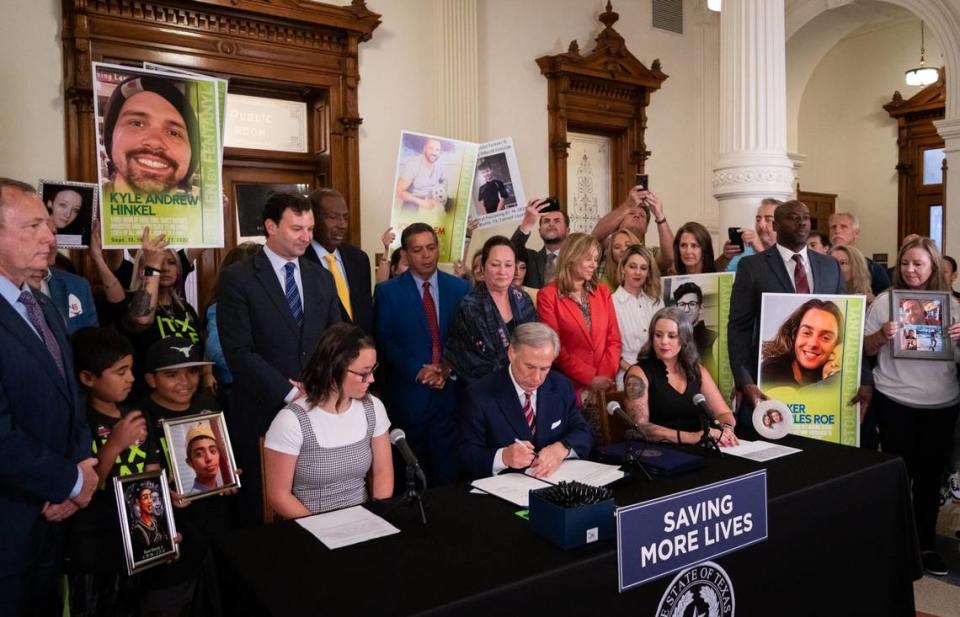
And possession of less than 1 gram will now be a third-degree felony, punishable by up to 10 years in prison. Defendants convicted of murder under the new law would face an additional sentence of five years to life.
The new law also classifies deaths caused by fentanyl to be labeled as “fentanyl toxicity” or “fentanyl poisoning” on death certificates when appropriate. Parents like Hellstern pushed for the change because her son did not die from taking too much of a drug; he died because he unknowingly took a pill laced with a more deadly one.
Preliminary data on a dashboard that tracks Texas fentanyl deaths shows more than 2,100 people statewide died of accidental poisoning last year.
Will the new Texas law make a difference?
Tarrant County officials have been on the front line to push for the state’s homicide law.
“We’re just gonna get those people off the street,” said Phil Sorrells, the county’s criminal district attorney, “and it helps us get them off the street if we have a bigger hammer that we can use against these drug dealers.”
But others have concerns.
Drug policy experts say such laws rely on a tough-on-crime mindset that actually exacerbates the problem and fails to address the root of the crisis.
“Criminal penalties are often the quick response and viewed as a one-stop shop instead of working on the deeper public health solutions that can make a difference,” said Miriam Krinsky, founder and executive director of Fair and Just Prosecution, a network of prosecutors from across the country who aim to promote a fairer justice system.
Experts and victims’ families worry that in practice, addicts or people who did not know a pill contained fentanyl will be easy targets of drug-induced homicide convictions.
While the intent of the law is typically to go after kingpins and high-level dealers, a 2022 report from Fair and Just Prosecution found that did not happen in practice. Nationally, half of drug-induced homicide prosecutions were of family or friends of victims, not dealers. The dealers who were charged “were at the very bottom of the trafficking chain,” the report said.
Different ideologies for law
Tarrant County officials also have different ideas of how the drug-induced homicide law should be implemented.
Goldman, the legislation’s sponsor, said the intent is to go after high-level dealers and “the individuals doing this on a grand scale.” Low-level dealers — like a teenager unintentionally selling a friend a counterfeit pill — are not the target, Goldman and Sorrells said.
“What we would want to know is where did you buy it from, we’re looking for the dealer,” Sorrells said. “That’s where I see this law applied, is to the dealer.”
Tarrant County Sheriff Bill Waybourn, however, wants to use the updated fentanyl laws to send a message to “anyone who conducts that kind of business in Texas.”
“The message is that if you’re doing this as a part-time college student selling dope, it could cost you the rest of your life. And that’s the message that we want to send,” Waybourn said. “And still go after the big guys, we want to do that too, and we’re certainly doing that.”
He said the amount of drugs seized in Tarrant County has skyrocketed since 2020. That year, the narcotics unit seized $3.5 million worth of drugs, including meth, fentanyl, marijuana and heroin. That number jumped to $35 million in 2022, he said.
To Waybourn, anyone involved with selling fentanyl is fair game.
“We know there are 16-, 17-, 18-year-olds that are the school pushers,” he said. “And they are going to be caught up in that… We need to get that message out that it can ruin your life.”
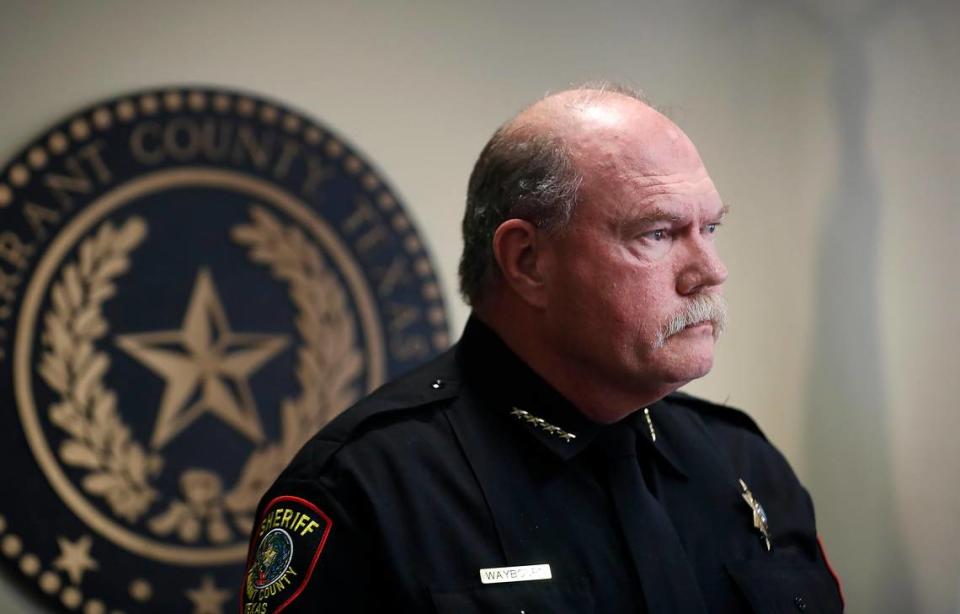
As an example, he mentioned that an 18-year-old in Tarrant County currently faces 40 years in prison for selling fentanyl.
Critics like Krinsky say such cases show laws already exist to convict people of drug crimes, and harsher laws are not necessary.
“There are pretty extensive drug laws on the books,” she said. “I don’t think there is a dearth of tools to have criminal accountability.”
When asked about existing federal drug laws, Waybourn said federal investigators already have heavy caseloads. The updated laws can help the state “share the load.”
Charging low-level dealers and people who have substance use disorders does not disrupt distribution, said Regina LaBelle, a former top drug policy official in the Obama and Biden administrations. Transnational criminal organizations are responsible for fentanyl distribution, she said, and those groups “are somewhat oblivious to sending messages.”
Experts also say prosecution-based policies actually cause more fentanyl-related deaths, because people in a position to call 911 for someone overdosing might not do so because they are afraid of prosecution. Drug-induced homicide laws have also been shown to be applied disproportionately to Black people, according to a 2017 Drug Policy Alliance report.
“I think that the objective is a laudatory one, but how things play out in the real world are different than the objective one might have,” Krinsky said. “When these laws come about, it’s the individuals who are there when the overdose occurs or the person who is jointly using who end up getting targeted and caught in the net.”
Good Samaritan laws, which grant legal protections for people who call for emergency assistance in the event of a drug overdose, can help reduce that risk, Krinsky said. Texas passed a Good Samaritan law in 2021 known as the Jessica Sosa Act.
‘So many people are getting away with murder’
For many parents who lose a child to fentanyl, advocacy is a way to honor their child’s memory and transform their grief into action.
Adolph Alvarez hopes the harsher penalties will hold distributors accountable, like the people he believes gave his daughter fentanyl in 2022.
Abigil Alvarez loved to travel and planned to spend her 19th birthday in Colorado. In 2021, she graduated high school in Saginaw, and hoped to become an esthetician. Her family described her as a creative soul who never met a stranger and put others before herself.
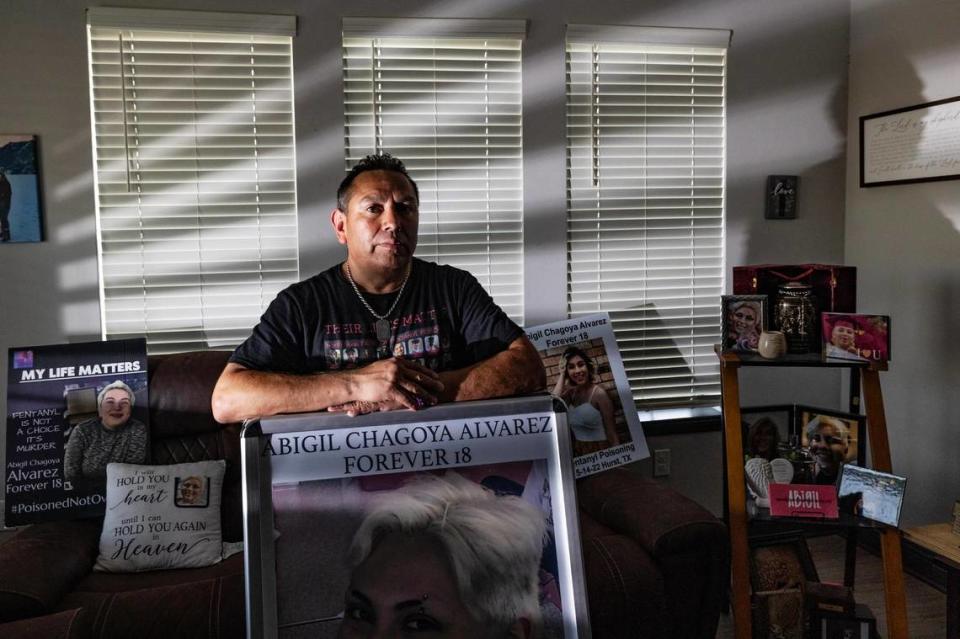
“She was our baby girl,” Alvarez said.
In May 2022, Abigil died in a Hurst apartment from fentanyl poisoning. Her father said there is no evidence she asked for or took any drugs willingly prior to her fatal overdose. The case is still under investigation.
Adolph Alvarez travels across the state speaking at events to raise awareness about fentanyl.
“So many people are getting away with murder in Tarrant County,” he said.
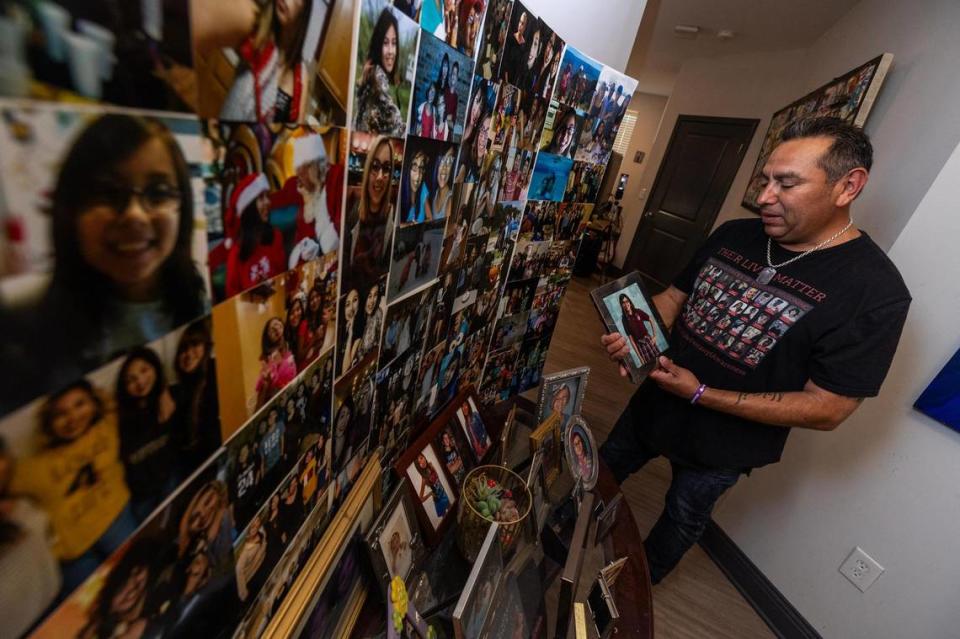
Christina Peña, who lives in Carrollton, is also a supporter of the drug-induced homicide law. Peña formed a Dallas-based advocacy group after her 21-year-old daughter, Angelina Rogers, died from fentanyl poisoning in 2020.
Rogers had endometriosis, a painful disease in which tissue grows outside of the uterus. She was usually bubbly, giggly and full of life, but often called her mom crying from the pain. When a friend of the family offered Rogers an oxycodone, she took half of it, not knowing the counterfeit pill contained fentanyl. Rogers, who had just graduated from cosmetology school, fell asleep and never woke up.
“Our babies didn’t want to die, they wanted to live,” Peña told the Star-Telegram. “But a lot of them suffered from pain or mental health issues.”
Peña supports the law to its fullest extent. She hopes people “think twice before selling.” If she had the choice, she said, the woman who sold her daughter the counterfeit pill would be charged with murder.
“Even if they give the pill and don’t know it has fentanyl in it, it is illegal and they should be charged,” she said. “Our kids are being deceived. They didn’t wake up and say, ‘I want to be a drug addict.’”
Some parents have mixed feelings on the law.
Jacob Reyes, 21, was in his second year at the University of Oklahoma when he died in his sleep after taking a tramadol pain pill that was laced with fentanyl. Reyes was a talented saxophone player who was extremely smart and close with his family in Fort Worth. He had recently injured himself, his mother Margaret Reyes said, and one of his friends gave him the pills.
The case is still under investigation. In terms of a criminal sentence, Margaret Reyes said she mostly wants to make sure those who gave her son drugs do not hurt or kill anyone else.
“They’re going to have to take responsibility and answer when it’s time for them to talk to the Lord,” she said. “But like I said, they’re kids. I just want them to apologize and take responsibility that they did wrong and that they will never do it again. And then it’s up to the courts to decide how to punish them.”
Andrea McCutcheon’s daughter, Valerie Vineyard, died after taking what she thought was a Percocet with her boyfriend. Her boyfriend survived after being resuscitated six times, but Valerie, 19, died from the fentanyl-laced pill in Saginaw.
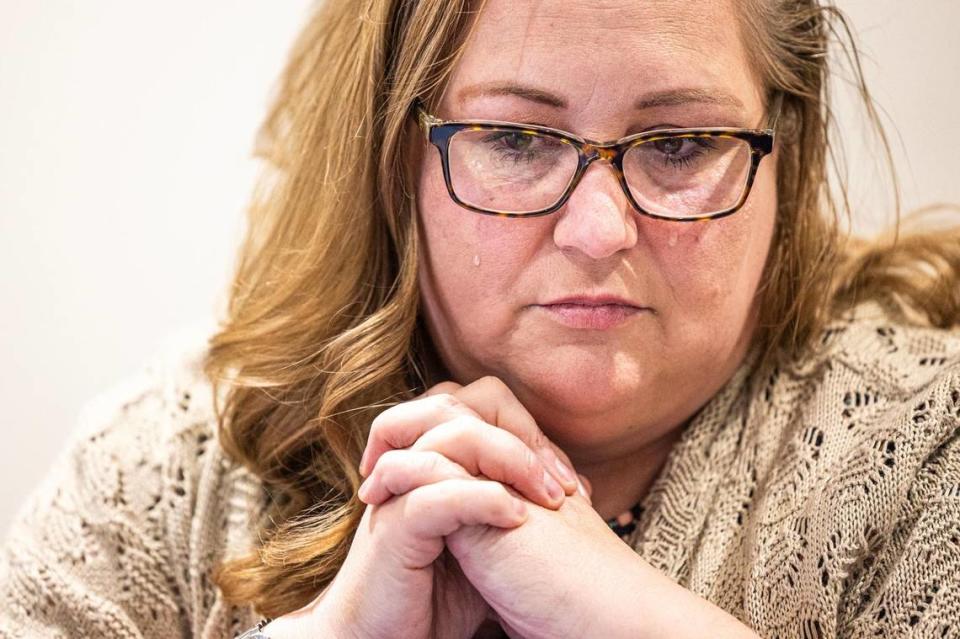
Vineyard had dabbled in drugs like Xanax and had asked her mother to go with her to Narcotics Anonymous so she could get treatment. One Saturday in 2021, they made plans to go the following week.
The next day, Valerie took the counterfeit pill that ended her life.
The person accused of selling Vineyard the drugs, Ariel Vargas, has been charged with negligent homicide, according to Tarrant County court records. He also faces multiple drug charges, each of which carries a potential sentence of five years to life.
McCutcheon focuses mostly on raising awareness that “one pill can kill.” She goes back and forth about what sentence she thinks Vargas should receive.
“I’m not one of those people that are just like let him go and do 50 years because to me, he lives with that every day,” she said. “But I do think he needs to have some type of punishment... . How many years is somebody’s life worth?”
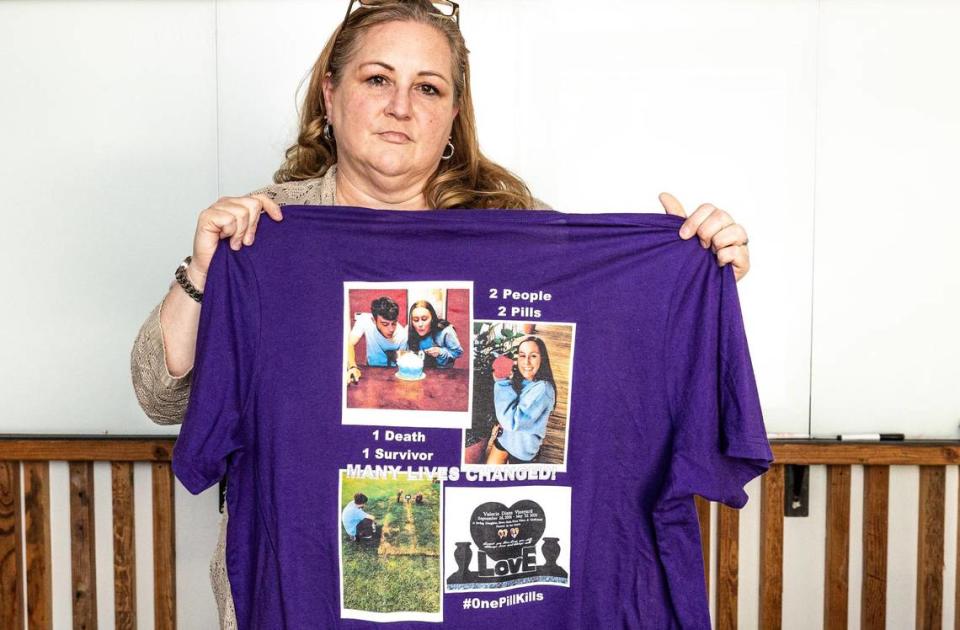
‘Could cost you your life’
As an increasing number of people are lost to fentanyl, “there’s a frustration that we need to do something,” said LaBelle, the former top drug policy official under Presidents Obama and Biden.
But harm reduction policies, which focus on mental health and treatment options, are more effective solutions to the fentanyl crisis, said LaBelle, who is now the director of the Addiction and Public Policy Initiative at Georgetown University.
For example, fentanyl test strips allow people to safely check if a pill or drug has fentanyl in it, reducing drug overdoses and poisonings. Fentanyl test strips are illegal in some states, including Texas, though Abbott recently expressed support for decriminalizing them. Many parents, including Alvarez, lobbied in the 2023 Texas legislative session to decriminalize the strips, but the Senate declined to pass the proposed law.
“To address the fentanyl crisis, we need proven harm reduction approaches that will save lives today,” Krinsky said. “Drug-induced homicide statutes do the opposite, forcing people into unthinkable situations where they have to weigh whether to call for help and risk prosecution for homicide or allow a friend or loved one to die of an overdose.”
Hellstern agrees with the need for a more comprehensive plan.
“The root is mental health,” Hellstern said. “I wish I could have told Kyle or anybody that that pill, that one high, that one shoot-up is not going to make you feel better. And I would have told him that that could cost you your life. It’s happening to everyday people who are fighting everyday life.”
If you or someone you know has a substance use disorder, you can call the Substance Abuse and Mental Health Services Administration’s national helpline; a free, confidential, 24/7, 365-day-a-year treatment referral and information service (in English and Spanish) for individuals and families facing mental and/or substance use disorders, at 1-800-662-HELP (4357).
Also available 24/7 for Texans, the Texas Addiction Hotline is free and anonymous for any resident to receive assistance with addiction at 866-210-1303.



